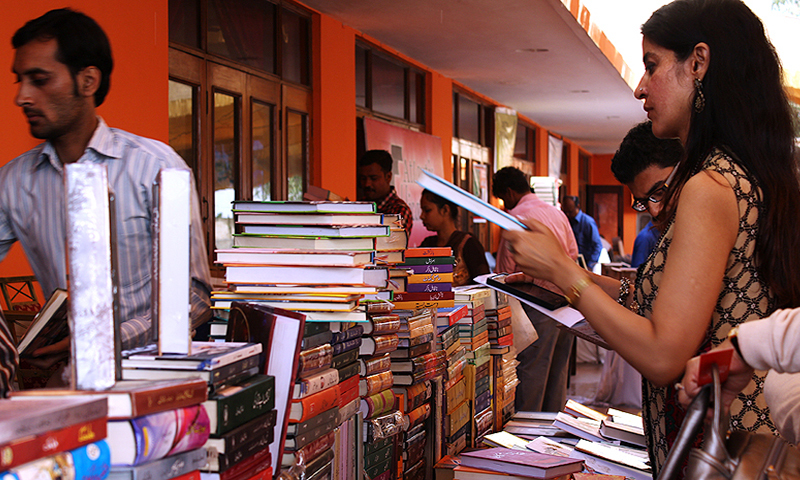The recent social media fervour over the 10-book challenge provided some slight relief from the “Ice Bucket Challenge”, but it highlighted a lacuna in the way literature is cherry-picked, taught and consumed in a certain section of Pakistani society.
The challenge itself was deceptively straightforward: nominate friends to compile a list of ten books that had sustained a long-term effect on them. The nominee in turn was expected to nominate another ten friends from their list and so it continued – an excellent idea indeed, and I personally extracted tremendous enjoyment out of scanning the lists of many people.
Alarm bells, however, started to ring when in many cases I struggled to find a single non-white, non-British writer on the 10-book list. The usual suspects, ranging widely over the centuries, were pervasive: Jane Austen, Charles Dickens, the Bronte sisters, William Shakespeare, Enid Blyton and Thomas Hardy topped the charts as it were.
Explore: Pakistani fiction
Now consider this in light of the recent move on the part of the British conservative government to promote more “Britishess” in its English curriculum in the UK. To make the syllabus more nationally-centred, former education secretary Michael Gove axed American classics like To Kill a Mocking Bird and Of Mice and Men from the national curriculum. So the message was: buy British, even when it came to reading.
The resulting predicament from all this is that students in both Pakistan and England spend the vast majority of their English lessons consuming canonical and contemporary British fiction. In Pakistan, they do so out of a long standing regard for a super-imposed curriculum and in England, as Christopher Bigsby tartly puts it, “for fear that Romanian novels might move in next door”.
Whereas it would be wholly ludicrous to deny the literary merits of much of this fiction, it does wrongly facilitate the materialisation of a culture of “elite” books. These books are ones without which an education in English Literature is still considered vacuous and ill-conceived. While postcolonialists worldwide have long bemoaned the flawed conflation of “English Literature” and “Literature in English”; we remain in grave danger of endorsing the notion that excluding the plentiful and excellent pieces of Indian, Pakistani, Bangladeshi, African, Middle Eastern, Chinese and Canadian fiction from an entire lifetime’s worth of education is, somehow, acceptable.
Also read: 2013: yet another prolific year for Urdu literature
I managed to acquire an undergraduate degree in English from Pakistan, without so much as grazing past a postcolonial novel or poem; British novelist E.M Forster’s A Passage to India is the only brief and altogether ironic attempt that I can recall, at exploring postcolonialism in literature.
Whilst this meant that my knowledge of critical theory from Samuel Johnson to T.S Eliot was unquestionably sound, I was never able to read or think beyond the realm of the “Britishness” that defines the way in which English Literature is usually understood by a section of the Pakistani public.
I accepted the somewhat odd fact that all the literary characters I experienced had English names, traipsed the English countryside and ate food that I could only imagine the appearance of. If only you knew how many hours I have devoted in contemplating the taste and appearance of “blancmange” and “black pudding”!
Read on: Imagining Pakistan in fiction
The British-designed curricula, harking back in many instances to colonial rule, is now hardly an adequate framework to achieve the desired aims of Literature – to foster understanding, create empathy, promote the tenets of multiculturalism and globalisation while enhancing personal, social and cultural awareness.
In Europe and America, there is now a small yet growing academic interest in literature from Pakistan, both Anglophone and Urdu. My own research explored the transnational features of four contemporary Pakistani writers of fiction in the English language, particularly after 9/11.
I strongly believe that this trend needs to set in Pakistani academic circles too, and that a wholehearted incorporation of postcolonial novels into curricula would be a good starting point. The translation into Urdu of a steadily increasing Anglophone Pakistani fictional corpus would also be an integral part of this process. Anglophone Pakistani fiction, including that of Kamila Shamsie, Mohsin Hamid, Danial Mueenuddin, Uzma Aslam Khan and Bina Shah, is edgy – it has, so to speak, a bite to it!
While it is important to explore the traditional literary canon of fiction, literature has a more significant and urgent role too. I would be inclined to argue that the study of literature should be as much a matter of business as pleasure.
I aspire to a 10-book challenge that reflects such an engaging diversity – one that categorically refuses to accept the superiority of one literature over another. Give me Shakespeare. Give me Ghalib too. Give me Seth. Give me Adichi.
And let me have them all at once, together.












































